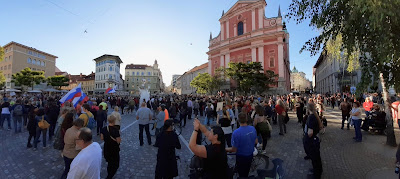by Mateja Mihinjac
Public protests and demonstrations erupted throughout the world in recent years warning us about the perils of social inequity, racial inequality, and environmental concerns. And now, over the past few weeks, as anti-government protests are underway, much of the world has united over anti-discrimination and Black Lives Matter.
One common thread that links these protests is dissatisfaction with government leaders and their inaction that underlie these disparities.
CASE IN POINT - SLOVENIA
In my home country of Slovenia in central Europe, every Friday since April citizens protest against the government’s misuse and abuse of power related to controversial decisions masquerading under the pretense of COVID-19 interventions.
The public outcry started on March 13 as the new right-wing coalition government took over the leadership following the resignation of the previous centre-left Prime Minister (just after his government declared a state of epidemic). Very quickly, problems arose in the public eye about a lack of legitimacy for this new government.
 |
| Recent anti-government Slovenian protest, Ljubljana - photo Creative Commons |
The backlash arose from numerous questionable government decisions: Ministerial salary raises at the time when the unemployment rate had peaked; poorly communicated COVID-19 intervention measures; and attempts to drastically increase police powers and discredit journalists. It included irregularities in the purchase of personal protective equipment, which is currently undergoing police investigation. Many accuse the government of autocratic aspirations.
More recently, the government changed environmental laws and introduced another COVID-19 intervention act. These measures exclude the citizens and limit the participation of NGOs and environmental organisations from decision-making in new infrastructure and building projects, a move many see as prioritizing capital over nature.
The resulting mass civic engagement and social unrest are unprecedented in my lifetime. Weekly demonstrations across Slovenia attract thousands of people! In the capital city of Ljubljana, the public has been gathering in front of the House of Parliament shouting “thieves” and “fascists”. They wave signs such as “our country is not your sandpit” signifying that the government should not be allowed to mold the country to suit their needs.
The government responded with barricading access to the square in front of the Parliament building, increasing police controls and identity checks, and criminalizing participation in demonstrations. As elsewhere around the world, such responses signal the need for reform and confirm that government institutions must listen to citizens' voices more seriously than in the past.
 |
| Ljubljana is the capital of Slovenia in central Europe - photo Wiki Commons |
GOOD GOVERNANCE
A system in which the government wishes to single-handedly control decision-making is not a system that is well-suited for any democratic country, especially during the COVID-19 pandemic. Competent democratic governance requires that everyone has a voice and that decisions are based on broad consensus. It requires that all sectors are accountable to the public and that processes are fair and transparent.
And how can this be achieved? Various organisations call for inclusive citizen participation. They call for empowering citizens and for participatory governing processes. Protesters demand reform of particular sectors, such as the police.
ANOTHER PATH FORWARD
SafeGrowth takes another path. By proposing a system of networked urban villages, the SafeGrowth model calls for democratic local governance within each of the neighbourhood villages.
It transfers the decision-making power of the citizens from the national or large regional scale to a local-neighbourhood scale, but it does so in such a way that local, democratic and fully trained organizations can plan for neighbourhood needs. Moreover, the SafeGrowth’s Livability Academy program develops local leaders who represent the voice of residents and lead changes that address social and racial inequity. Neighbourhood-level change thereby becomes the bridge between government organisations and the wider community.
In SafeGrowth neighbourhoods from New Zealand to New Orleans residents thus become an integral part of their own governing system and they link to other surrounding neighbourhoods to coordinate how they solve problems and plan for their own future.
 |
| Pre-pandemic Ljubljana, in more peaceful times |
WHAT'S TO BE DONE?
It is no longer sufficient for governments to only ask citizens for input when mandated or when it creates top-down plans for development. It is no longer sufficient that the government expects that its citizens must trust the government and public institutions without question or dissent – the government also needs to trust the public and civic organisations, and start transferring the decision-making power back to local communities.
And along the way, we must create a more sustainable governance system in which politicians start considering the long-term consequences of their decisions beyond the expiry date of the next election. If we fail to do this, democratic governance may quickly become irrelevant and lose legitimacy. We need to turn this around. The country should be its citizens’ sandpit.
Leave a comment
Please add comments to SafeGrowth. I will post everyone except posts with abusive, off-topic, or offensive language; any discriminatory, racist, sexist or homophopic slurs; thread spamming; or ad hominem attacks.
If your comment does not appear in a day due to blogspot problems send it to safegrowth.office@gmail.com and we'll post direct.